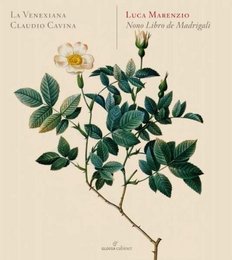| All Artists: Luca Marenzio, La Venexiana Title: Marenzio: Nono Libro de Madrigali Members Wishing: 0 Total Copies: 0 Label: Glossa Original Release Date: 1/1/2009 Re-Release Date: 6/30/2009 Album Type: Import Genres: Pop, Classical Styles: Vocal Pop, Opera & Classical Vocal, Symphonies Number of Discs: 1 SwapaCD Credits: 1 UPCs: 675754016388, 8424562809062 |
Search - Luca Marenzio, La Venexiana :: Marenzio: Nono Libro de Madrigali
 | Luca Marenzio, La Venexiana Marenzio: Nono Libro de Madrigali Genres: Pop, Classical
|
Larger Image |
CD Details |
CD ReviewsWhat Do Lightning and Genius Have in Common? Giordano Bruno | Wherever I am, I am. | 01/08/2010 (5 out of 5 stars) "Contrary to popular wisdom, they both tend to strike the same place twice, and more than twice. Bolts of musical genius must have struck the Italian cities of Ferrara and Mantua in brilliant clusters in the last half of the 16th C, with a scatter of flashes hitting Florence as well. Claudio Monteverdi (1567-1643) is today the best known of the electrifying madrigalists of the era, though he's more associated with Venice in people's minds than with Tuscany. But Monteverdi was not an isolated genius; he inspired, and drew inspiration, from Giaches de Wert, Luzzasco Luzzaschi, Caccini, D'India, assorted Rossis, the notorious Carlo Gesualdo, and above all Luca Marenzio (1553-1599). Nearly everyone credited Marenzio's powerful influence, particularly Gesualdo, and yet Marenzio's fame and fortune collapsed with the precipitous decline of the Este court in Ferrara. It may have been a grand error, in the long run of posthumous fame, that Marenzio accepted a 'plum' position at the court of Sigismundo II in faraway Poland in the 1590s. When he returned to Italy, around 1598, his patrons were all dead or in papal disfavor. He died rather mysteriously soon, at the tender age of 46. Judging by his last published collection of madrigals, the Ninth Book recorded here, he was at the height of his genius.
Marenzio was above all a madrigalist, though he composed some fine motets and masses. His work at the Este court in Ferrara had always been on the cutting edge of 16th C modernism, spurning the somber intellectualism of Franco-Flemish polyphony in pursuit of passionate affect and individualistic expression. The texts he chose were the newest and most daring, and he was the unrivaled exponent of crafting the music to amplify the sense of the words. In musical structures, however, he has been preconceived by modern critics as a conservative, sticking tightly to polyphony and not foreseeing the 'inevitable' triumph of baroque monody, the 'seconda prattica' as exponded by Monteverdi. Indeed, Marenzio's madrigals are thoroughly polyphonic, without more than a whisk of basso continuo. This is true of the Nono Libro, published in 1599, but Marenzio was not so much a conservative as an alternative. There's nothing old-fashioned about the intensity - ferocity! - of his polyphony in his last collection. Not even Gesualdo ever exploited the potentials of chromatic polyphony with as much emotional fervor as Marenzio. Oddly enough, he chose texts of the leanest, most concise/precise sort, reaching back to Petrarch and even to Dante (totally forgotten in the late 16th C) in order to construct a musical language of maximum emotional drama. This Ninth Book is one of the greatest achievements of late Renaissance musical theory, on the threshold of its abandonment for the thinner possibilities of the baroque. Lightning always seems to strike when La Venexiana records. Their performance of Marenzio is everything it should be to establish the composer's sublimity. Judging by the rapid 'unavailability' of La Venexiana's Monteverdi recordings, it would be very wise to buy this CD while you can." |

 Track Listings (14) - Disc #1
Track Listings (14) - Disc #1